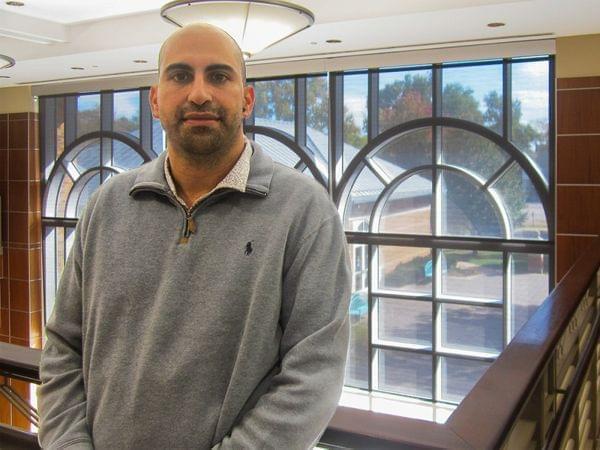U of I Urbana Campus No Longer On AAUP’s Censure List

Steven Salaita during a 2014 visit to the University of Illinois. The university's revocation of his faculty appointment due to his controversial Twitter statements led to the Urbana campus' censure by AAUP, which has only just been lifted. Jim Meadows/Illinois Public Media
The University of Illinois’ Urbana campus has been taken off an academic censure list.
Delegates to the annual meeting in Washington, DC, of the American Association of University Professors voted Saturday to take the campus off the list — recognizing that the school had addressed concerns over the Steven Salaita controversy.
AAUP delegates voted to censure the U of I in 2015, a year after the school revoked the faculty appointment of Steven Salaita for controversial Twitter posts about Israel. Supporters saw the tweets as criticism of the Israeli government, but others saw Salaita’s tweets as anti-Semitic.
The administration’s revocation, later backed up by the Board of Trustees, came after Salaita had already given up a tenured faculty position at Virginia Tech. Salaita responded to the loss of his appointment by suing the university.
Some months after the censure, Salaita reached a financial settlement with the U of I. And an AAUP statement says that after negotiations with the university, the administration reaffirmed its commitment to academic freedom, and changed procedures in its academic appointment process.
A report from the AAUP’s “Committee A” on academic freedom notes that an AAUP representative visited the U of I Urbana campus in April of this year, and reported to Committee A that the campus’ climate for academic freedom was “robust.”
The lifting of the censure was hailed by UIUC Chancellor Robert Jones.
“I’m pleased to learn that AAUP recognizes our efforts and is taking this positive action”, Jones said in a statement reported by the News-Gazette. Jones said the university was committed to the free pursuit of ideas, even those considered “dangerous … and even threatening.”
According to the News-Gazette, Jones said such ideas “have the potential to reqrite history and disrupt governments. Sometimes they just lead us down dead ends and even are deemed failures. Still we must be a place where our students and scholars alike have the freedom to pursue them all.”
Links
- AAUP Censure Of UI Continues, Pending Action On Change To Appointment Process
- AAUP Censures U Of I Over Salaita
- AAUP Committee Formally Recommends U of I Censure
- AAUP Takes Next Step Towards Possible U of I Censure
- U of I - Salaita Agreement Finalized; Payment To Salaita Is Next
- U Of I Trustees Approve $600,000 Settlement With Salaita, He Will Not Teach At University
- The Lessons Learned From Salaita’s Incendiary Tweets
- Anita Hill Cancels U of I Appearance Over Salaita Lawsuit
- Prof. Salaita Sues U of I Leaders, Board Of Trustees
- U of I Trustees: Salaita Case Will Not Be Reconsidered
- Trustees Reject Salaita Hire On 8-1 Vote
- Prof. Salaita Speaks Publicly For First Time About Losing U of I Position
- AAUP Urges U Of I To Pay Salaita

